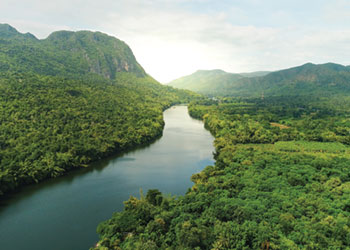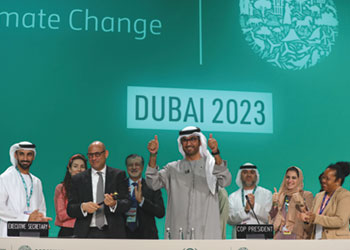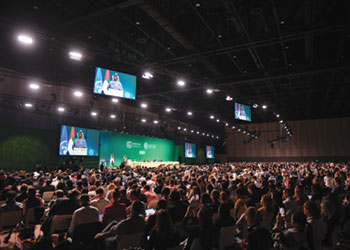
 Dr Sultan, fourth from left, and Stiel, second from left, at the COP28 closing
Dr Sultan, fourth from left, and Stiel, second from left, at the COP28 closing
After a raft of pledges at COP28, governments and businesses will need to turn them into real-economy outcomes. The global stocktake clearly shows that progress is not fast enough, but undeniably it is gathering pace
If anything, the call by the chief of the Abu Dhabi National Oil Company (Adnoc) and President of the 28th Conference of Parties (COP28) to 'transition away from fossil fuels' – the main driver of climate change – was promising.
The audience, representing every country (Party) on the planet, applauded in unison as Dr Sultan Al Jaber brought down the hammer on the closing day of the 2023 United Nations Climate Change Conference (UNCCC), held from November 30 to December 13, 2023, at Expo City, Dubai, the UAE.
In a demonstration of global solidarity, negotiators from nearly 200 Parties came together in Dubai with a decision on the world’s first ‘global stocktake’ to ratchet up climate action before the end of the decade – with the overarching aim to keep the global temperature limit of 1.5 deg C within reach.
It is the first time such an agreement has been reached in 28 years of international climate negotiations.
The commitment is included in the first 'global stocktake' of how countries can accelerate action to meet the goals of the landmark Paris Agreement.
The global stocktake is considered the central outcome of COP28 – as it contains every element that was under negotiation and can now be used by countries to develop stronger climate action plans due by 2025.
The stocktake recognises the science that indicates global greenhouse gas emissions need to be cut 43 per cent by 2030, compared to 2019 levels, to limit global warming to 1.5 deg C. But it notes Parties are off track when it comes to meeting their Paris Agreement goals.
The stocktake calls on Parties to take actions towards achieving, at a global scale, a tripling of renewable energy capacity and doubling energy efficiency improvements by 2030. The list also includes accelerating efforts towards the phase-down of unabated coal power, phasing out inefficient fossil fuel subsidies, and other measures that drive the transition away from fossil fuels in energy systems, in a just, orderly and equitable manner, with developed countries continuing to take the lead.
'Whilst we didn’t turn the page on the fossil fuel era in Dubai, this outcome is the beginning of the end,' said UN Climate Change Executive Secretary Simon Stiell in his closing speech. 'Now all governments and businesses need to turn these pledges into real-economy outcomes, without delay.'
Dr Sultan hailed the 'world-first' achievement of getting fossil fuels in a UN climate change agreement. He was appointed COP28 President-designate in January 2023, a move that sparked outcry as it sounded a contradiction to the very message of the conference.
PHASE OUT OR PHASE DOWN
There were countries that wanted a clear call for a fossil-fuel 'phase-out'. But in all fairness, countries, especially those developing, need to be given flexible timelines to cut down on fuel consumption. An abrupt halt to fossil fuels could be a step forward and two backwards.
Prince Abdulaziz bin Salman, Saudi Arabia's Energy Minister, threw his support behind the final COP28 deal as it leaves countries to decide for themselves on suitable pathways to transition to cleaner sources of energy.
'What is there now, the issue of immediate and gradual disposal (of fossil fuels) has been buried,' Prince Abdulaziz told Al Arabiya television, adding that the deal would not affect the ability of the world's top oil exporter to sell its crude.
The prince referred to the text of the agreement which stipulates that countries transition according to their 'nationally determined manner' and according to 'different national circumstances, pathways and approaches.'
'They are mostly reaffirming our understanding of the climate change agreement, leaving countries without restrictions passed down from entities that are not party to your decision making is what is important,' he said.
'There are a number of countries that produce oil and gas, you know who they are, but they stepped up and said we want this to succeed and they said we are transitioning,' John Kerry, US Special Presidential Envoy for Climate, told reporters after the deal was passed.
'Saudi Arabia for instance is a very big producer and Prince Abdulaziz came and stayed and negotiated,' he added.
PROGRESS MADE
 |
World leaders at COP28 ... united in the fight against climate changea |
Parties reached a historic agreement on the operationalisation of the loss and damage fund and funding arrangements – the first time a substantive decision was adopted on the first day of the conference. Commitments to the fund started coming in moments after the decision was gaveled, totaling more than $700 million to date.
There was more progress on the loss and damage agenda with an agreement also reached that the UN Office for Disaster Risk Reduction and the UN Office for Project Services will host the secretariat of the Santiago Network for Loss and Damage. This platform will catalyse technical assistance to developing countries that are particularly vulnerable to the adverse effects of climate change.
Parties agreed on targets for the Global Goal on Adaptation (GGA) and its framework, which identify where the world needs to get to in order to be resilient to the impacts of a changing climate and to assess countries’ efforts. The GGA framework reflects a global consensus on adaptation targets and the need for finance, technology and capacity-building support to achieve them.
INCREASING CLIMATE FINANCE
Climate finance took center stage at the conference, with Stiell repeatedly calling it the 'great enabler of climate action.'
The Green Climate Fund (GCF) received a boost to its second replenishment with six countries pledging new funding at COP28 with total pledges now standing at a record $12.8 billion from 31 countries, with further contributions expected.
Eight donor governments announced new commitments to the Least Developed Countries Fund and Special Climate Change Fund totaling more than $174 million to date, while new pledges, totaling nearly $188 million so far, were made to the Adaptation Fund at COP28.
However as highlighted in the global stocktake, these financial pledges are far short of the trillions eventually needed to support developing countries with clean energy transitions, implementing their national climate plans and adaptation efforts.
ROAD TO COP29 AND BEYOND
The negotiations on the ‘enhanced transparency framework’ at COP28 laid the ground for a new era of implementing the Paris Agreement. UN Climate Change is developing the transparency reporting and review tools for use by Parties, which were showcased and tested at COP28. The final versions of the reporting tools should be made available to Parties by June 2024.
COP28 also saw Parties agree to Azerbaijan as host of COP29 from November 11-22, 2024, and Brazil as COP30 host from November 10-21, 2025.
At the summit, discussions continued on setting a ‘new collective quantified goal on climate finance’ in 2024, taking into account the needs and priorities of developing countries. The new goal, which will start from a baseline of $100 billion per year, will be a building block for the design and subsequent implementation of national climate plans that need to be delivered by 2025.
Looking ahead to the transitions to decarbonised economies and societies that lie ahead, there was agreement that the mitigation work programme, which was launched at COP27 last year, will continue until 2030, with at least two global dialogues held each year.
In early 2025, countries must deliver new Nationally Determined Contributions (NDCs).
Countries must also prepare and submit their first-ever biennial transparency reports by the end of 2024.
At the closing of COP28, Stiell said the UN Climate Change was creaking under the weight of mandated processes and workstreams.
'There will be reams of analysis of all the initiatives announced here in Dubai. They are a climate-action lifeline, not a finish line. Now all governments and businesses need to turn these pledges into real-economy outcomes, without delay. The global stocktake showed us clearly that progress is not fast enough, but undeniably it is gathering pace.'







































































